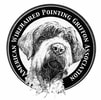Breeders' Best Practices
-New breeders should be encouraged to use mentors. A list should be developed by the Board, and assigned by region.
-Breeders should learn about genetic defects of the breed, and be honest about which occur in their own line.
-Adherence to breed standards as well as hunting instincts should be very closely considered in any breeding.
-Test when there is testing available from various certifying or testing labs, such as OFA, CERF, PENNHip, K locus (tan point), etc.
-Breeders are encouraged to post results of testing on a public database. Know which dogs in a given pedigree are carriers or affected with genetic defects. For a list of AWPGA-recommended tests, click here.
-For serious health defects, do not breed close relatives, as they are more likely to carry similar genes.
-Know the age of onset of potential genetic defects.
-Disclose any genetic defects to a buyer, and provide test results and any medical records to the buyer.
-Be prepared to take back a genetically defective puppy, and replace it with a healthy puppy.
-Those who inbreed and line-breed must learn basic genetic principles, and be prepared to remove inferior offspring from the breeding program.
-Affected and carrier dogs should be sold with breeding restrictions/AKC Limited Registration.
-Dogs expressing genetic disease or anomalies should not be used for breeding.
-Dogs that test positive as carriers of genetic disease or anomalies should be used for breeding by exception only.
-All puppies should be tested for specific diseases of concern, and those that are carriers should be sold with breeding restrictions/AKC Limited Registration.
-Follow up on dogs that are sold. Many genetic diseases show in the adult dogs long after the puppies go to the buyers.
-Breeders must educate their non-hunting puppy owners this is a hunting breed and the potential troubles these instincts may produce.
-Breeders should strive to place their hunting quality puppies in a hunting home.
-All puppies should be placed in a good home, first and foremost.
All images and content Copyright © 2023 the American Wirehaired Pointing Griffon Association, ALL rights reserved.
Copyright Policy /Acceptance & Use Policy
Copyright Policy /Acceptance & Use Policy
